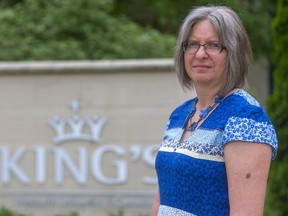Death, mourning and how 'confusing' COVID-19 funeral rules harm families

Article content
New COVID-19 rules about how many people can attend funerals are so confusing and inconsistent, they’re only causing more suffering, a London funeral home director says.
Joseph O’Neil, owner of O’Neil Funeral Home in London, said he ended up giving one family three different head counts of the mourners allowed to attend a loved one’s funeral over the last week due to evolving regulations.
“It’s the constant state of change and the confusion that I think is wearing hard on families,” O’Neil said. “Every church and funeral home is running into this problem.”
Regulations for funerals rolled out on June 12 increased the number to 50 from 10, he said. Then, one day later, a new directive was released allowing 30 per cent occupancy in his chapel and 50 per cent outdoors at grave sites for funerals.
Then a few days later, on June 16, new restrictions came out about social distancing, directing funeral homes to supply one staff member to each 10 people who attend. The social distancing rules mean everyone has to stay two-metres apart, further complicating event planning as funeral directors try to figure out the best estimates they can.
The evolving rules are just another example of how COVID-19 has changed the way that people are now forced to grieve, O’Neil said.
As a substitute to the in-person rite of passage that allow people to mark their loved one’s death, families have turned to live-streaming and well as videotaping, which was used rarely before the pandemic.
King’s University College professor Sherry Smith, an expert in death, dying and bereavement, said COVID-19 has shifted the way we grieve “especially with our funeral rituals.”
“For many people we aren’t able to say goodbye anymore. At end of life we may not be able to go in and say goodbye to our relative or friend due to restrictions in the hospitals or long-term care centre,” she said.
“We certainly have heard many stories of people being separated from their loved ones in Ontario and everywhere around the world”
But it’s not just funerals or the deaths that cause grief, she said.
“There are whole other losses that people are dealing with right now – these non-death losses include the loss of our job, our income, our routines, our freedoms, weddings and graduations, travel or even the physical connectedness with others and how we believe that the world should be,” she said.
“These losses have shattered our assumptive world.”
But because the losses aren’t linked to death often they are not recognized as grief, she said.
“It’s important to remember any loss, change or transition can cause grief but that said we don’t necessarily all have the same experience of non-death loss,” she said. “It’s important to support one another the best way we can if we feel we are struggling.”
As to whether COVID-19 will change the way we mourn the dead forever, O’Neil believes it will.
“The only prediction I will make is whatever the new normal is when we land our feet – and that won’t be until or cure or a vaccine is out – will be very different than we see today,” he said.
DEATHS DUE TO COVID-19 (as of July 18)
- Canada: 8,299
- Ontario: 2,553
- Middlesex-London: 57






Postmedia is committed to maintaining a lively but civil forum for discussion. Please keep comments relevant and respectful. Comments may take up to an hour to appear on the site. You will receive an email if there is a reply to your comment, an update to a thread you follow or if a user you follow comments. Visit our Community Guidelines for more information.